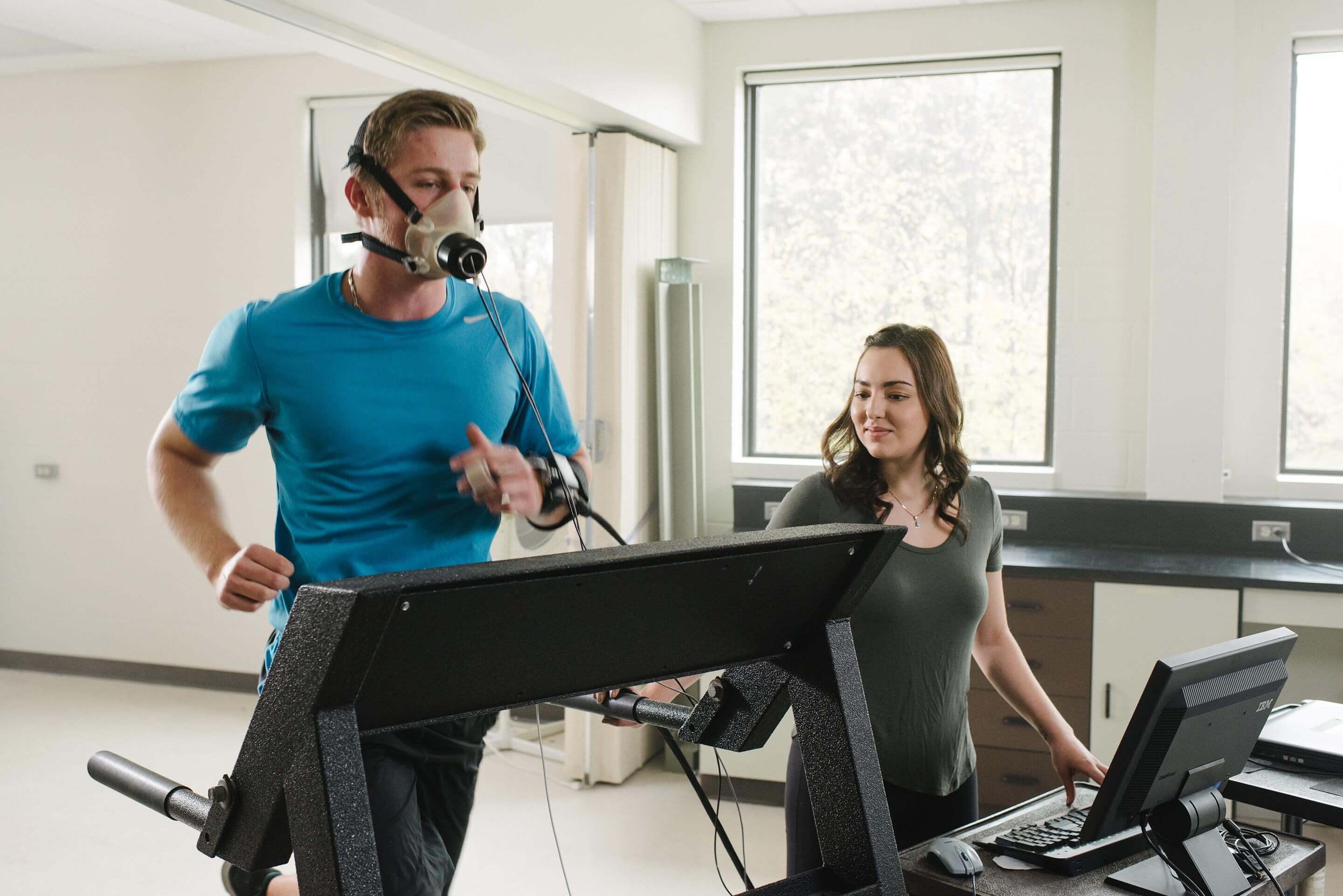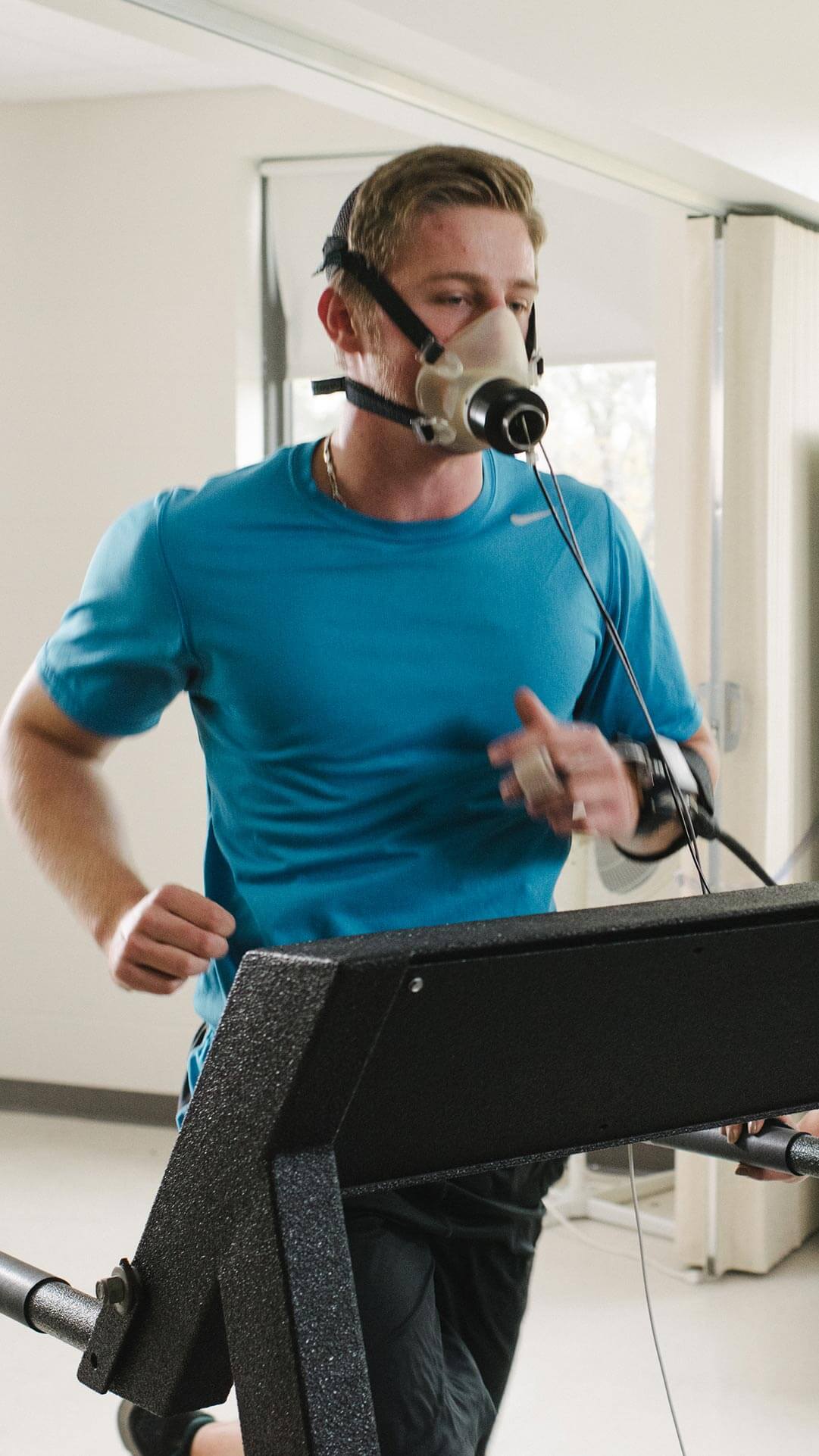Kinesiology Courses
Kinesiology (Bachelor of Kinesiology)
Honours Major: Kinesiology, B. Kin. (20 courses)
- KPE-118, 119, 218, 222, 223, 304, 312, 313, 318, 345, 418, 420, 422, 432;
- One of KPE-315 or KPE-335;
- One of KPE-480 or KPE-490;
- Two KPE-200-, 300-, or 400-level electives;
- Four fundamental units: KPE-142; 158; 159; one elective
- BIO-121, HSC-221;
- One of MAT-201 or PSY-201;
- One of PHY-115 or PHY-121;
- One of PSY-121 or PSY-122
A minor is required. A psychology minor is recommended.
Kinesiology (Bachelor of Science)
Honours Major: Kinesiology, B.Sc. (20 courses)
- KPE-118, 119, 218, 222, 223, 304, 312, 313, 318, 345, 405, 418, 422, 432;
- HSC-342;
- One of MAT-201 or PSY-201;
- One of KPE-480 or 490;
- Two KPE-200-, 300-, or 400-level electives;
- Four fundamentals: KPE-142; 158; 159; one elective
Cognate Requirements:
Note: All students registered in the Kinesiology B.Sc. program must choose a minor from the following:
The Kinesiology B.Sc. program currently meets the course requirements for registration with the College of Kinesiologists of Ontario. Also, see Professional Preparation on page 63 of the Academic Calendar
For more information on the Co-operative Education Program see page 57.
Kinesiology (Bachelor of Arts)
Honours Major: Kinesiology, BA (20 Courses)
- KPE-118, 119, 218, 222, 223, 304, 312, 313, 318, 345, 405, 418, 422, 432;
- One of MAT-201 or PSY-201;
- One of KPE-315 or 335;
- One of KPE-480 or 490;
- One KPE-200-, 300-, or 400-level elective (for Physical Education related careers, KPE-328 is recommended);
- Eight fundamental units: KPE-142; 158; 159; 160; and four electives
Cognate Requirements:
Course Details
Foundations of Human Anatomy I KPE-118
A study of human anatomy, emphasizing the basic anatomical structures used in locomotion and fundamental motor skills. Topics include basic chemistry, cell structure and function, histology, integumentary system, skeletal system, muscular system, nervous system, endocrine system, cardiovascular system, respiratory system, digestive system, urinary system, immunity, fluids and electrolytes, and reproductive system. Students will examine each body system on a microscopic and a gross level.
Corequisites:
Recommended: BIO-121
Foundations of Human Anatomy II KPE-119
A continued study of the foundations of gross human anatomy, building on the knowledge gained in KPE-118. This course focuses on the following systems: nervous, endocrine, integumentary, digestive, lymphatic, urinary, and reproductive. The course format will include lecture, accompanied by problem- or experiment-based learning.
Prerequisites:
KPE-118
Fundamentals of Tennis KPE-140
Activity courses designed to enable students to develop basic skills and knowledge of a particular sport, as well as physical fitness and a proper attitude toward participation in sport
(0.75 credits each).
Fundamentals of Pickleball KPE-143
Activity courses designed to enable students to develop basic skills and knowledge of a particular sport, as well as physical fitness and a proper attitude toward participation in sport
(0.75 credits each).
Fundamentals of Yoga KPE-144
Activity courses designed to enable students to develop basic skills and knowledge of a particular sport, as well as physical fitness and a proper attitude toward participation in sport
(0.75 credits each).
Fundamentals of Soccer KPE-151
Activity courses designed to enable students to develop basic skills and knowledge of a particular sport, as well as physical fitness and a proper attitude toward participation in sport
(0.75 credits each).
Fundamentals of Basketball KPE-152
Activity courses designed to enable students to develop basic skills and knowledge of a particular sport, as well as physical fitness and a proper attitude toward participation in sport
(0.75 credits each).
Fundamentals of Volleyball KPE-153
Activity courses designed to enable students to develop basic skills and knowledge of a particular sport, as well as physical fitness and a proper attitude toward participation in sport
(0.75 credits each).
Fundamentals of Badminton KPE-154
Activity courses designed to enable students to develop basic skills and knowledge of a particular sport, as well as physical fitness and a proper attitude toward participation in sport
(0.75 credits each).
Fundamentals of Dance KPE-158
Activity courses designed to enable students to develop basic skills and knowledge of a particular sport, as well as physical fitness and a proper attitude toward participation in sport
(0.75 credits each).
Fundamentals of Co-operative and Experiential Games I KPE-160
Activity courses designed to enable students to develop basic skills and knowledge of a particular sport, as well as physical fitness and a proper attitude toward participation in sport
(0.75 credits each).
Human Physiology KPE-218
A study of human physiology, emphasizing the basic anatomical structures used in locomotion and fundamental motor skills. Includes a bi-weekly two-hour lab.
Prerequisites:
KPE-118Year 2 standing
Assessment of Human Fitness KPE-222
Students will be introduced to the fundamental principles of fitness assessment. Various fitness tests for the different fitness parameters including muscular strength and endurance, anaerobic and aerobic power, flexibility, and balance will be practiced. Students will participate as both the test administrator and test subject for all tests. Weekly lecture and lab.
Prerequisites:
KPE-218
Nutrition KPE-223
This course presents the basic principles of human nutrition and the science behind them. Topics include a full assessment of nutrients, digestion, comparison of food guides, eating disorders, body composition and management, nutrition for sports, and popular trends and myths. Students will evaluate their own nutrient intakes and plan a healthy diet.
The Psychology of Health and Well-Being KPE-327
An examination of the psychological aspects of health and illness. This course examines psychosocial, behavioural, and biomedical processes in the prevention of illness and the promotion of health and well-being (physical, psychological, and spiritual). The emphasis will be on theory-based psychological research
and on the practice of health psychology. Selected topics to be explored include: the psychophysiological disorders, attitudes and behaviours which promote good health, the relationship between stress and disease, coping with stress, understanding and coping with pain and illness, lifestyle and risk factors in various medical disorders.
Prerequisites:
PSY-121 or 122
Coaching KPE-251
An introduction to the foundations and principles of coaching sport and physical activities. Topics include coaching philosophy, coaching objectives and style, as well as principles of communication and motivation, teaching, physical training and management in athletic coaching. The course will also examine Canada’s Long Term Athlete Development Plan (LTAD) and Teaching Games for Understanding TGFU
of coaching. With this course, students will be eligible for level I Coaching Theory Certification from the National Certification Program (NCCP).
Prerequisites:
Year 2 standing or permission of the instructor
Biomechanics KPE-304
A study of biomechanical principles applied to human movement and sport through lectures, readings, and labs. Assessment of sport technique, equipment, performance, and ergonomics will be addressed. Includes a bi-weekly two-hour lab.
Prerequisites:
PHY-115
Care and Prevention of Injuries KPE-312
A study of the common methods used to treat and care for athletic injuries, exploring training and rehabilitation programs, and providing practical experience in utilizing specific preventative and treatment techniques.
Prerequisites:
KPE-118and Year 3 standing
Motor Learning KPE-313
This course is an introduction to motor learning. Through the course, students will examine phases of skill acquisition, transfer of learning, training principles, retention of motor skills, and the influence of motivation on the acquisition and rehabilitation of movement. Includes a weekly one-hour lab.
Special Populations KPE-315
An introduction to special populations, together with an examination of topics related to integration, design and objectives of physical activity programming through a Christian worldview. Included in this course is a field trip to Variety Village and a 10-hour placement working with individuals with special needs.
Exercise Physiology I KPE-318
A study of the physiological principles involved in human exercise.
Prerequisites:
KPE-218,
KPE-222Year 3 standing or permission of the instructor
Organization of Intramurals, Athletics and Physical Education KPE-328
A study of the organization and administration of intramurals, athletics and physical education programs for elementary and secondary school students. Recommended for students pursuing an education-related career.
Sociology of Sport KPE-335
This course is seminar style, where students engage in critical examination and discussion of social and social-psychological dynamics of sports in modern society through a Christian worldview. Areas receiving special attention are youth sports, interscholastic sports, and professional sports. Emphasis is placed on describing and understanding sports, participants and observers, and the relationship of sport as an institution to the rest of society.
Prerequisites:
APS-120
Psychology of Sport and Exercise KPE-345
An introduction to the psychological aspects of behaviour in sport and exercise. This course examines both traditional (educational) sport psychology and clinical sport psychology through a Christian worldview. Topics include personality, emotions, motivation and behavioural change, anxiety, stress and coping, group cohesion, aggression and moral behaviour, youth development, aging and involvement, coaching, exercise adherence, exercise and mental health, and the development and prevention of health issues. Further, this course takes a critical look at present psychological interventions that have been used to improve athletes and exercisers’ performance and overall health and well-being.
Prerequisites:
PSY-121 or 122
Ergonomics KPE-405
An examination of topics in human factors (ergonomics) relating to injuries and injury avoidance. Students will become familiar with physical demand analyses and the principles involved in redesigning tasks to minimize risk of injuries. The focus will be on preventing musculoskeletal injuries and fatigue from a wide variety of occupational tasks. Students apply the course material to ergonomic assessments performed in actual workplaces.
Prerequisites:
KPE-304,
KPE-318Year 4 standing
Exercise Physiology II KPE-418
This course will provide an advanced understanding of cardiovascular and muscle physiology in relation to exercise, fitness and health through lectures, readings, and labs. Students will investigate the effect of lifestyle choices, aging, environment (temperature and microgravity), and disease on human physiology. Includes a weekly lab.
Corequisites:
KPE-318Year 4 standing in an honours program
Clinical and Rehabilitative Exercise Prescription KPE-422
Students will learn how to prescribe exercise for the purpose of disease prevention, treatment, and rehabilitation in those with chronic mental and/or physical conditions. An introduction to clinical procedures will assist students in preparing for clinical practice.
Prerequisites:
KPE-318Year 4 standing
Philosophy of Physical Education, Sports and Recreation KPE-432
This course introduces the student to philosophical reflections on physical education and sport and examines existing theories about physical education and sport in our society.
Prerequisites:
Year 4 standing. KPE-432 is the Capstone Course for the Physical Education Department and is required for all majors in the 4th year.
Internship KPE-480
A physical education, sport or recreation placement provides students with an opportunity to obtain direct experiences and exposure to some aspects of their area of study outside the classroom. Internships may be done in a variety of areas dealing with physical education, sport or recreation such as physiotherapy clinic, motor performance lab, or recreation centre. The purpose of the internship is to assist students in making career decisions and to prepare them for post-graduate educational and employment opportunities. See page 61 of the Academic Calendar for information on internships.
Prerequisites:
Year 4 standing in an honours program
Independent Research Project KPE-490
For more information on setting up an independent research project see page 61 of the Academic Calendar.
Prerequisites:
Year 4 standing in an honours program



